
After fifty years of Pride, what should we fight for next?
This year we’re celebrating 50 years of Pride in the UK. In this article, we’ll chart the major moments in LGBTQ+ history since the first Pride in 1972, and ask what still needs to change for LGBTQ+ people, today and in future.
2022 is a pivotal year for LGBTQ+ history in the UK. Fifty years after the first Pride in London, it’s time to reflect on everything our movement has achieved. At that first Pride in 1972, around 2,000 participants marched together, calling for gay rights. And throughout the 1970s, there were many other milestones – Gay News, Britain’s first newspaper, was founded. Switchboard, a London-based info and support helpline that still runs today, was established. The first trans conference was held in Leeds and the first gay and lesbian Trades Union Congress conference took place to discuss workplace rights. In a watershed moment, Maureen Colquhoun became Britain’s first openly lesbian MP.
In the 1980s, progress sped up rapidly as more LGBTQ+ people came out and demanded equal treatment. We saw the first Black Gay and Lesbian Group being formed, as well as the first bi group in the UK. Chris Smith became the first openly gay MP, and the Lesbian and Gays Support the Miners campaign was launched. But as well as increased visibility, the LGBTQ+ population in the UK faced a backlash. In 1988, Margaret Thatcher introduced Section 28, a piece of legislation which banned local authorities from ‘promoting homosexuality’ and effectively banned the discussion of LGBTQ+ issues in schools. More happily, in 1989, Stonewall was founded to fight back against Section 28.
The 1990s saw the World Health Organisation declassify same-sex attraction as a mental illness, and the age of consent for sexual relations between men lowered from 21 to 18. Trans youth charity Mermaids was founded, and two openly gay MPs are elected in the 1997 elections.
Under Tony Blair’s government in the 2000s, a raft of positive legislation was introduced. The UK Government lifted the ban on LGB people in the armed forces, the age of consent was lowered to 16, same-sex couples were granted equal rights when applying for adoption, and Section 28 was finally repealed across the UK. We also saw the Civil Partnership Act and the Gender Recognition Act introduced in 2004, granting same-sex couples the same rights as married couples, and allowing trans people to acquire new birth certificates. Finally, The Equality Act (Sexual Orientation) Regulations 2007 outlawed the discrimination in the provision of goods, facilities, services, education and public functions on the grounds of sexual orientation.
In the 2010s, the Equality Act added gender reassignment as a protected characteristic. We saw the introduction of same-sex marriage across the UK, and Ruth Davidson became the first openly gay leader of a political party in the UK. The ban on donating blood for gay and bi men was lifted, and the UK Government issued a posthumous pardon to all men convicted under sexual offences laws which criminalised people for being bi or gay. And we saw the first Trans Pride and Bi Pride events take place in the UK.
So it's fair to say we’ve come an incredibly long way since 1972. By 2019, London Pride saw 1.5 million people celebrate and protest in support of LGBTQ+ rights. But looking around us today, it’s clear that we still haven’t reached equality. Just this year, we saw online estate agency Purple Bricks remove a listing last month when the owners of a house in Surrey refused to allow two gay men to view their property. Luke Whitehouse was told by the owners that they could not sell the house to ‘two men in partnership […] as it is contrary to the gracious teaching in God’s Word’. While we know progress has been made, we still have to battle regressive attitudes across society.
More frighteningly, reports of anti-LGBTQ+ hate crime and violence continue to rise. Barely a month into this year, we saw coverage of the murder of Dr Gary Jenkins, who was killed in a park by attackers hurling homophobic abuse. The prosecution lawyer, employed to win justice for Gary, said in his opening statement that Gary’s ‘sexual predilections were to be his undoing… he rendered himself hopelessly vulnerable and an easy target’. The lawyer later apologised and Gary’s murderers will soon be jailed, but nevertheless, stereotypes about gay and bi men being promiscuous are still being used justify violence and blame the victims of horrific attacks. In 2022, we are still not safe in our own communities.
So, this year, we’re looking ahead to imagine what we want the world we want for LGBTQ+ people today, and in fifty years’ time. Right now, we’re campaigning for a full, legislative ban on conversion therapy in the UK, so that no more LGBTQ+ people are subject to this degrading practice. We’re also fighting for better treatment for LGBTQ+ refugees, who deserve not only safe passage but a warm welcome when they arrive in our country, and for equal access to IVF, so that LGBTQ+ people don’t need to break the bank to become parents.
What do you want to make a reality by Pride 100 in 2072? Let us know on Twitter by tagging @stonewalluk and using the hashtag #TakePride.


